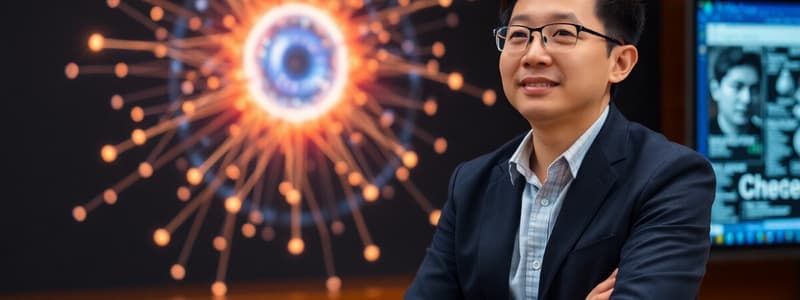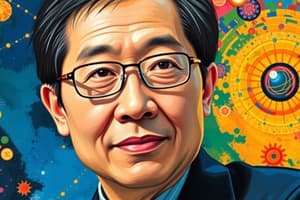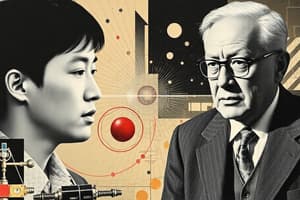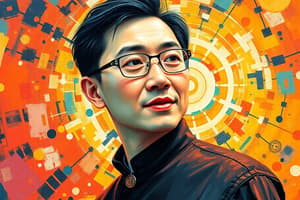Podcast
Questions and Answers
What was Yang Chen-Ning's field of specialization?
What was Yang Chen-Ning's field of specialization?
- Condensed matter physics
- Theoretical physics (correct)
- Biophysics
- Astrophysics
Which theory did Yang Chen-Ning co-develop that is fundamental to particle physics?
Which theory did Yang Chen-Ning co-develop that is fundamental to particle physics?
- Relativity theory
- Quantum Electrodynamics
- Yang-Mills theory (correct)
- String theory
What significant prize did Yang Chen-Ning win in 1957?
What significant prize did Yang Chen-Ning win in 1957?
- Nobel Prize in Physics (correct)
- Abel Prize
- Turing Award
- Fields Medal
What does non-abelian gauge theory help to understand?
What does non-abelian gauge theory help to understand?
Which institution did Yang Chen-Ning primarily work at for his research?
Which institution did Yang Chen-Ning primarily work at for his research?
What aspect does gauge invariance relate to in Yang-Mills theory?
What aspect does gauge invariance relate to in Yang-Mills theory?
In which area has Yang Chen-Ning continued to influence younger physicists?
In which area has Yang Chen-Ning continued to influence younger physicists?
Which major contribution is Yang Chen-Ning known for in relation to forces?
Which major contribution is Yang Chen-Ning known for in relation to forces?
Flashcards are hidden until you start studying
Study Notes
Yang Chen-Ning
-
Basic Information:
- Born: October 1, 1922, in Hefei, Anhui, China.
- Nationality: Chinese-American.
- Fields: Physics, specializing in theoretical physics.
-
Education:
- Bachelor's degree from National Central University (now Nanjing University) in 1942.
- Master's degree from the University of Chicago in 1943.
- Ph.D. from the University of Chicago in 1948.
-
Career Highlights:
- Worked at Columbia University, where he conducted significant research.
- Notable for contributions in particle physics and quantum field theory.
-
Major Contributions:
- Co-developed the Yang-Mills theory, which laid the groundwork for the Standard Model of particle physics.
- Worked on non-abelian gauge theory, expanding understanding of fundamental forces.
- Collaborated with Robert Mills in the 1950s to develop concepts that became pivotal for particle physics.
-
Awards and Recognition:
- Nobel Prize in Physics (1957) alongside Tsung-Dao Lee for their work on parity violation in weak interactions.
- Member of several prestigious organizations, including the National Academy of Sciences.
-
Legacy:
- Influenced multiple areas of theoretical physics and contributed to the unification of the electromagnetic and weak forces.
- Continued to mentor and influence younger physicists in the field throughout his career.
-
Current Work:
- Active in various scientific and academic discussions, sharing insights on physics and its implications.
Key Concepts in Yang-Mills Theory
-
Gauge Invariance:
- Fundamental principle underlying the Yang-Mills theory, leading to the introduction of gauge fields.
-
Non-Abelian Gauge Theory:
- Generalization of the gauge principle which allows for symmetries that do not commute, vital for understanding the weak and strong forces.
-
Application:
- Basis for the Standard Model, providing a framework for particle interactions and the behavior of fundamental forces.
Additional Notes
- Yang Chen-Ning's work has played a crucial role in advancing theoretical physics and understanding of the universe at the most fundamental level.
- He is considered one of the leading figures in modern physics, with his theories impacting both academic research and practical applications.
Basic Information
- Yang Chen-Ning (C. N. Yang) was born on October 1, 1922, in Hefei, Anhui, China.
- He is a Chinese-American theoretical physicist.
Education
- Yang earned his Bachelor's degree from National Central University (now Nanjing University) in 1942.
- In 1943, he received his Master's degree from the University of Chicago.
- He completed his Ph.D. from the University of Chicago in 1948.
Career Highlights
- Yang Chen-Ning conducted significant research at Columbia University.
- He is recognized for his fundamental contributions to particle physics and quantum field theory.
Major Contributions
- He co-developed the Yang-Mills theory, which laid the foundation for the Standard Model of particle physics.
- His contributions to the non-abelian gauge theory expanded our understanding of fundamental forces in physics.
- In the 1950s, he collaborated with Robert Mills to develop concepts critical for particle physics.
Awards and Recognition
- He won the Nobel Prize in Physics in 1957 alongside Tsung-Dao Lee for their work on parity violation in weak interactions.
- He is a member of several prestigious organizations, including the National Academy of Sciences.
Legacy
- His work has influenced various areas in theoretical physics, including contributing to the unification of the electromagnetic and weak forces.
- Yang Chen-Ning has continued to mentor and influence younger physicists in the field throughout his career.
Key Concepts in Yang-Mills Theory
- Gauge Invariance:
- This fundamental principle underlying the Yang-Mills theory leads to the introduction of gauge fields, which are essential for describing fundamental forces.
- Non-Abelian Gauge Theory:
- This is a generalization of the gauge principle that allows for symmetries that do not commute. It is vital for understanding the weak and strong forces in particle physics.
- Application:
- The Yang-Mills theory forms the basis of the Standard Model, providing a framework for particle interactions and the behavior of fundamental forces.
Additional Notes
- Yang Chen-Ning's work has been instrumental in advancing theoretical physics and our understanding of the universe at the most fundamental level.
- He is considered one of the leading figures in modern physics, with his theories impacting both academic research and practical applications.
Studying That Suits You
Use AI to generate personalized quizzes and flashcards to suit your learning preferences.





